The Graduate (1967)
Starring Dustin Hoffman, Anne Bancroft, Katharine Ross, William Daniels, Murray Hamilton, Buck Henry and Norman Fell. Directed by Mike Nichols. From Embassy Pictures.

Benjamin Braddock (Hoffman) has just come home from a successful college career. He’s received by his family and their friends with much acclaim but he’s unsure about his future and this concerns him. While at loose ends, he is set upon by neurotic Mrs. Robinson (Bancroft), the dissatisfied wife of Ben’s father’s (Daniels) long-time business partner (Hamilton). Mrs. Robinson, making her desires plain, offers to engage in an affair with Ben. At first he balks but eventually he capitulates.
When the Robinson’s daughter, Elaine (Ross), comes home from Berkeley, Ben is encouraged by his folks to date her. Mrs. Robinson is vehemently against this but Ben gets backed into a corner and has to take Elaine out. At first, he tries to be obnoxious but becomes smitten with Elaine and she with him. As Ben and Elaine try to forge a relationship, Mrs. Robinson sabotages things and Elaine, repulsed when she learns about Ben and her mother, flees back to school. Now Ben really feels like he’s lost his way and decides to head to Berkeley to try to win her back.
The Graduate was based on a 1963 novel by Charles Webb. The screenplay retains much of the dialogue while jettisoning some seedier episodes. I won’t get into the life of Charles Webb, his wife and his family and I will simply say that they are “eccentric”. Webb has written a sequel to this his only notable work called Home School (2007). The plot of this story is wasted on the subject of homeschooling, a cause for which Webb and his wife had been advocates. Ben and Elaine are married and are fighting for the right to home school their children and they turn to Elaine’s mother for help. Like, really? More interesting is the 2005 film Rumour Has It… starring Jennifer Aniston, Kevin Costner and Shirley MacLaine. In that film, written by Ted Griffin (Ocean’s Eleven remake), Aniston finds out that her mother and grandmother may be the actual women that inspired Webb’s novel.
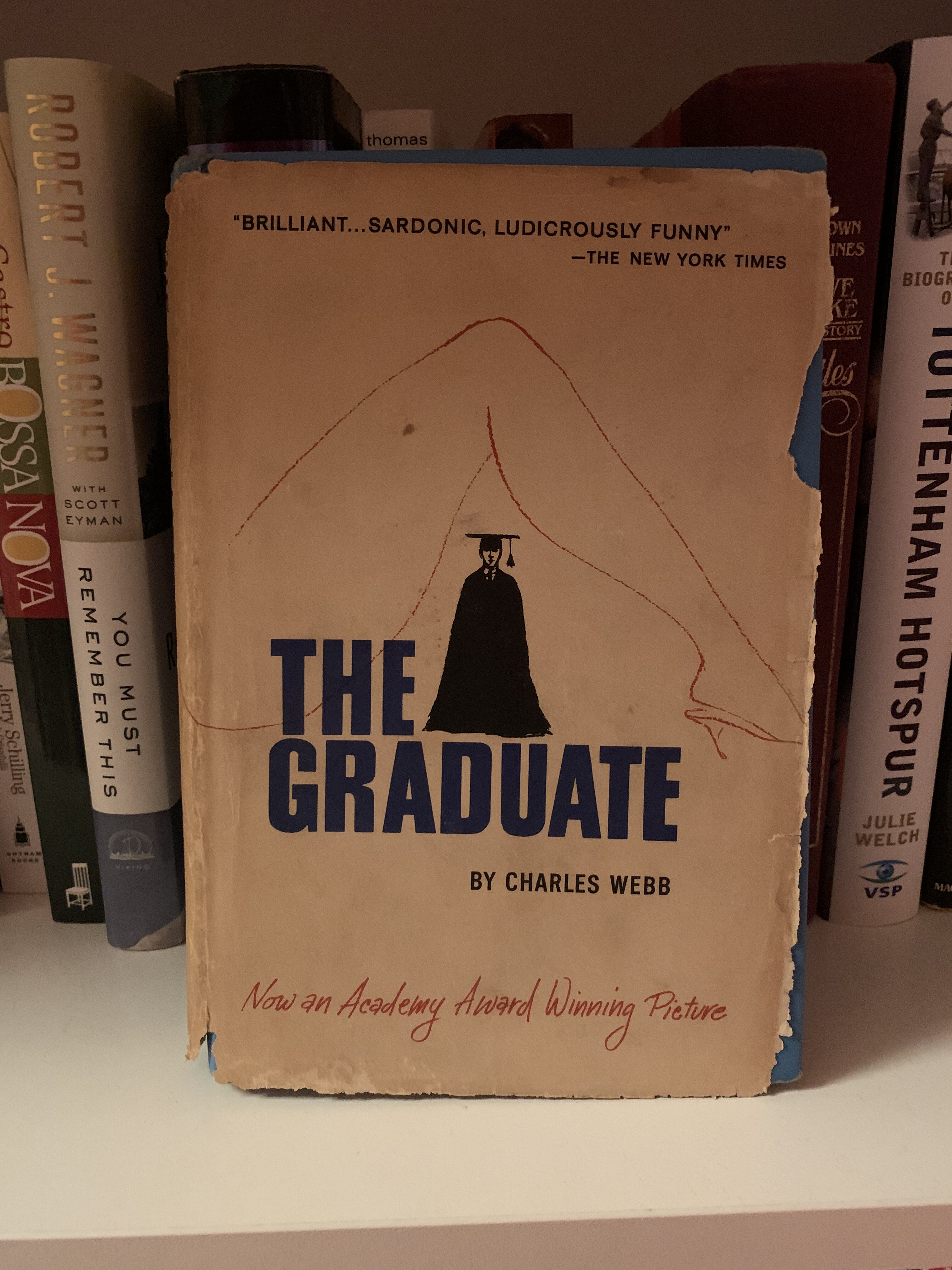

The script for The Graduate was co-written by Calder Willingham and Buck Henry. Willingham co-wrote the scripts for Paths of Glory, The Bridge on the River Kwai, The Vikings and Spartacus. Screenwriter, actor, comedian, producer and director Buck Henry had a long and prestigious career. In 1978, he was nominated for an Oscar for Best Director along with Warren Beatty for Heaven Can Wait. In The Player, the 1992 black comedy about the inner workings of Hollywood, Henry has a scene in which he pitches a sequel to The Graduate. Legendary director Mike Nichols won an Oscar for this film. He is one of history’s few EGOT winners and has directed numerous successful films including Who’s Afraid of Virginia Woolf?, Carnal Knowledge, Silkwood, Working Girl and Postcards from the Edge.
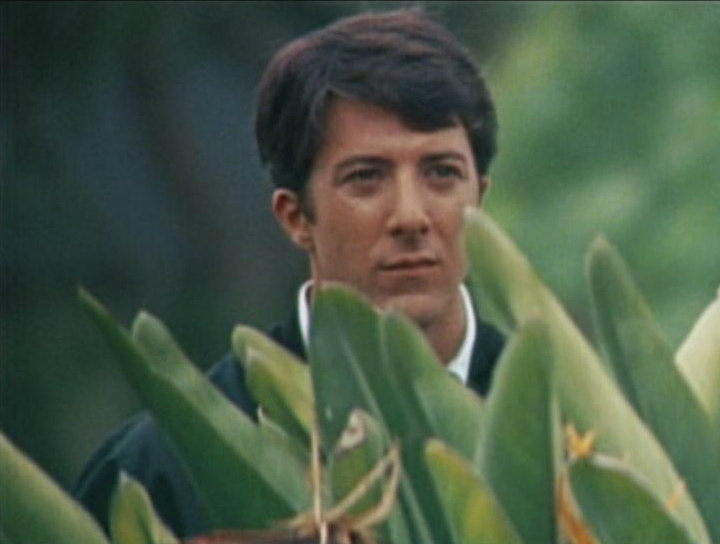
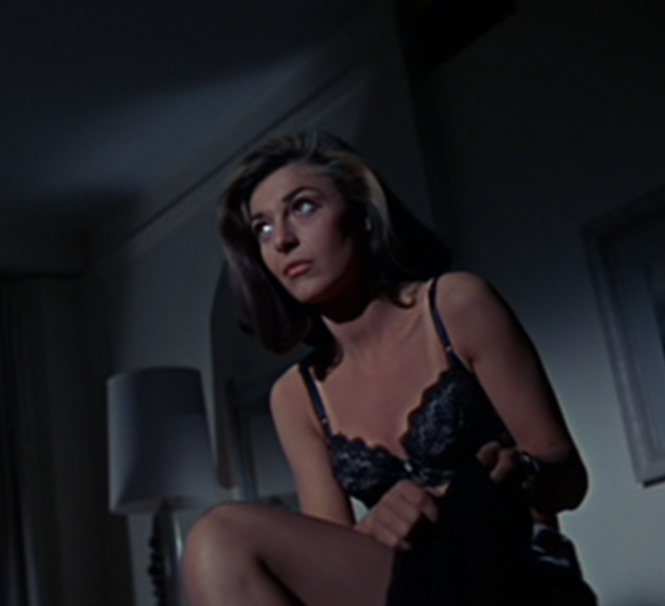
We all know Dustin Hoffman. The Graduate was his first major film and he earned an Academy Award nomination. He followed this with several notable portrayals in popular films such as Midnight Cowboy (Oscar nom), John and Mary, Straw Dogs, Papillon, Kramer vs. Kramer (Oscar win), Ishtar, Rain Man (2nd Oscar win) and Billy Bathgate. Anne Bancroft had appeared notably in Don’t Bother to Knock and Demetrius and the Gladiators before winning an Oscar for 1962’s The Miracle Worker, a role for which she had already won a Tony Award. Bancroft was nominated for a total of five Oscars. She was married to Mel Brooks from 1964 until her death in 2005 from uterine cancer.
The Graduate was the first major role for earthy beauty Katharine Ross. For her performance as Elaine she received a Golden Globe and an Oscar nom. She would go on to a respectable career which included critically acclaimed work in Butch Cassidy and the Sundance Kid and Tell Them Willie Boy is Here. She would later appear in The Stepford Wives (1975) but soon after contented herself with stage work and television films. She has been married five times – once to cinematographer Conrad Hall – and has been married to Sam Elliott (that’s a cool couple, actually) since 1984. The rest of the cast features Williams Daniels (Boy Meets World), Murray Hamilton (The Hustler, Jaws), unsung Brian Avery, who is in one of my 25 favourite movies, Under the Boardwalk (1989), Norman Fell and a young Richard Dreyfuss who shows up briefly and gets a line as he did in Valley of the Dolls, a film that was released a week before The Graduate.
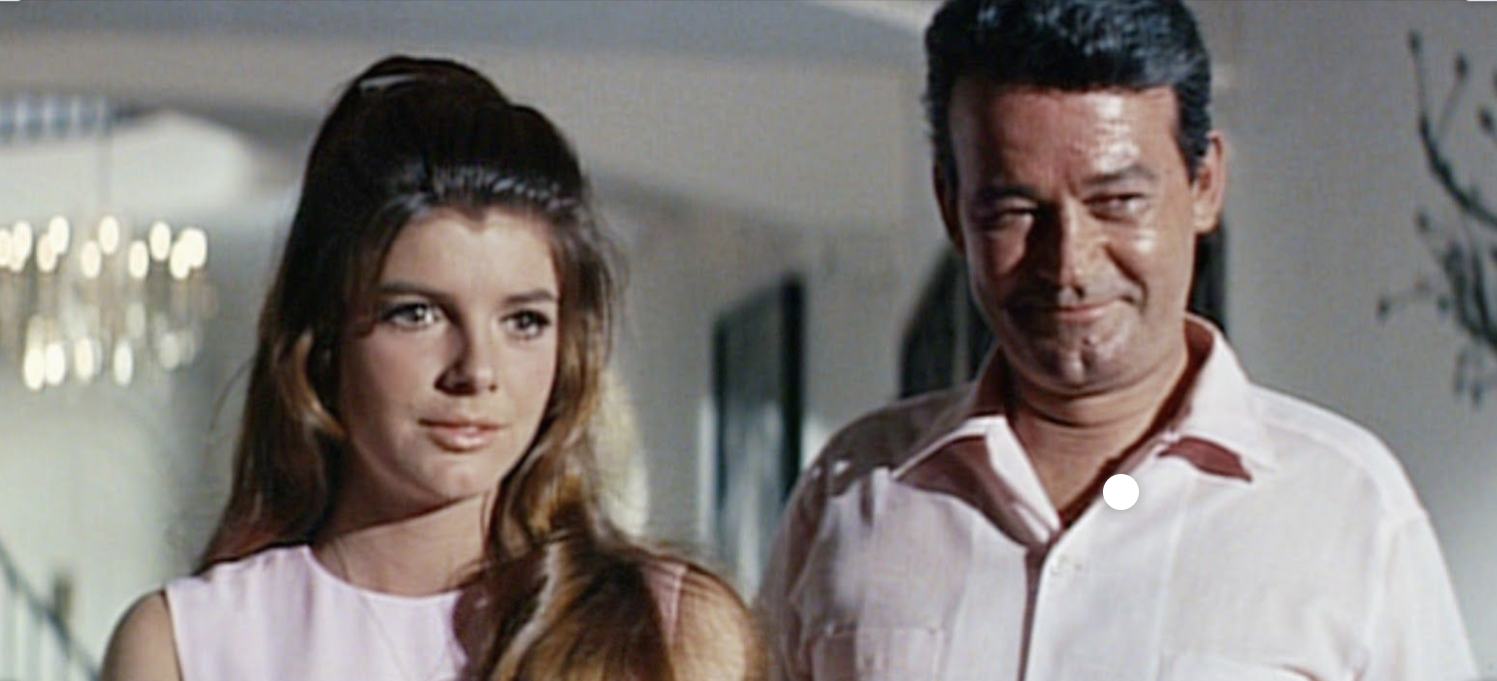
Interesting to note the scores of actors that were either considered for or actively sought the major roles. Doris Day and Ava Gardner turned down the role of Mrs. Robinson because of the nudity required. Joan Crawford, Angela Lansbury and Lauren Bacall inquired about the role. Also considered: Angie Dickinson, Sophia Loren, Judy Garland, Rita Hayworth, Susan Hayward and Lana Turner. Patty Duke, Faye Dunaway, Sally Field and Shirley MacLaine turned down the role of Elaine. Many actresses tested for the part but were rejected; Raquel Welch, Joan Collins, Goldie Hawn and Jane Fonda. For Elaine, director Nichols had a long shortlist that included most of the young talent in Hollywood.
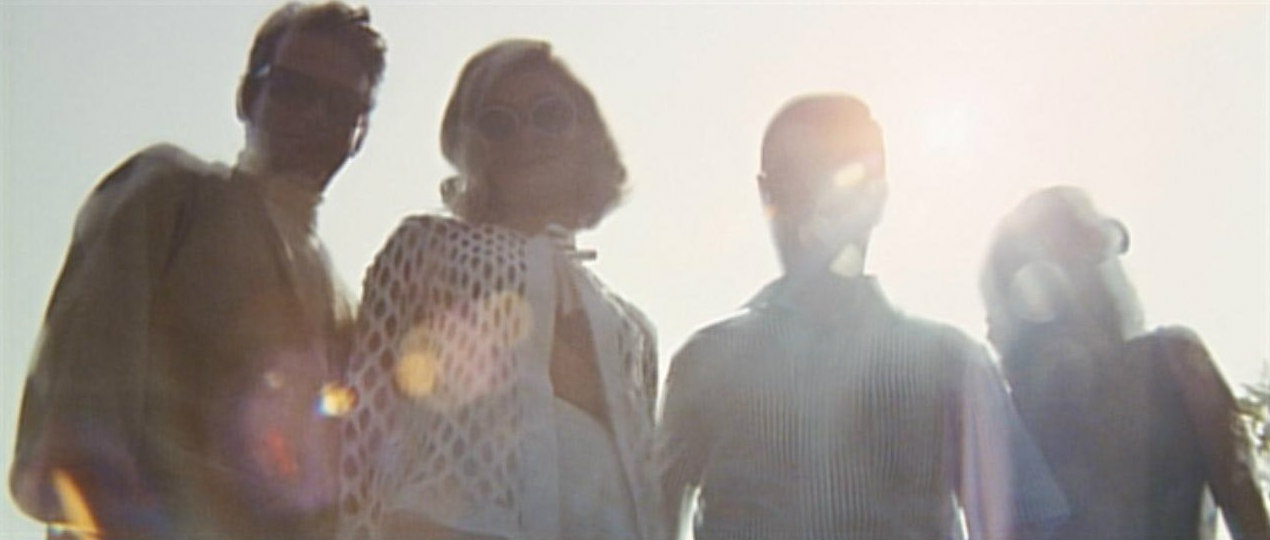
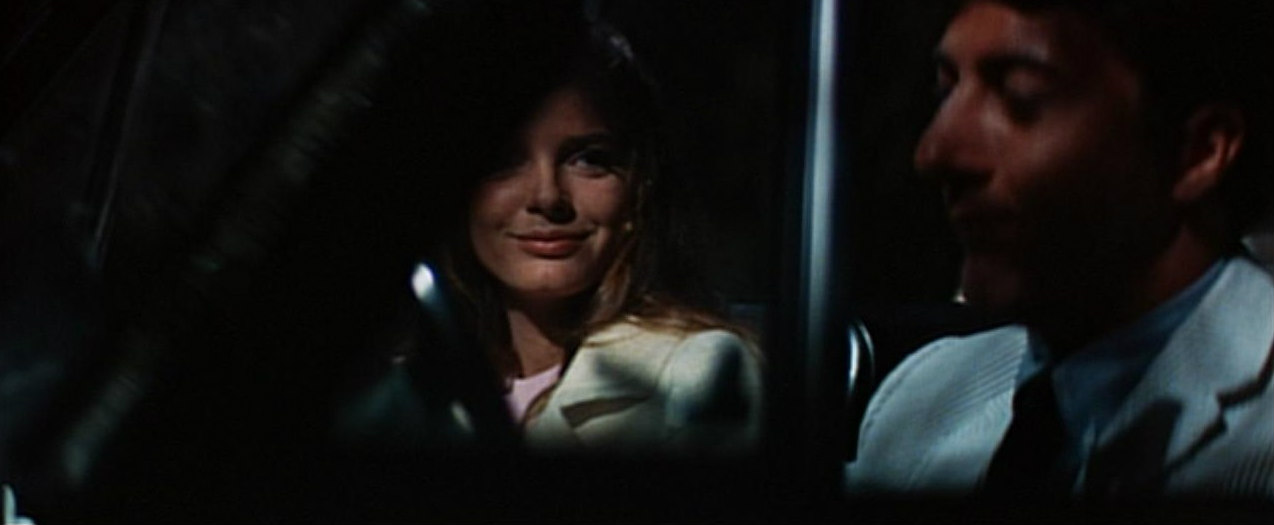
The casting of Dustin Hoffman is a story unto itself. Producers initially felt that the roles of all the participants should be blond-haired, blue-eyed SoCal types. When Hoffman came in to test, producers thought he was a messenger boy and even Ross – though chestnut-haired herself – was taken aback. For part of his test, Hoffman was to play a love scene with Ross, something he had never done much of before in his career. His fumbling awkwardness seemed to be just what Nichols wanted and Dustin was cast. Hoffman recalls feeling a sense of embarrassment when make-up and wardrobe people were vocal about not knowing what to do with him. He came away with the feeling that some of the crew and even reviewers after the film was released were being anti-Semitic in their criticism of him. Hoffman says that Nichols did a “brave” thing in casting him.
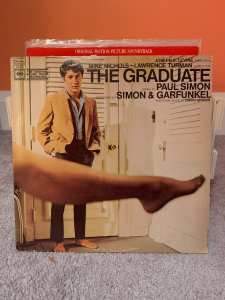
The soundtrack of the film is remembered today as being a vehicle for the music of Simon and Garfunkel. The music of the duo was initially to be used sparingly until Nichols decided he wanted to use their sound throughout the film. Nichols asked for three songs but Paul Simon was busy touring and could only come up with one. Nichols began pressuring Paul for more songs and Paul played him one he had been goofing around with. “But it’s about the old days”, Paul told Mike, “it’s about Mrs. Roosevelt and Joe DiMaggio. It’s not for a movie”. Apparently after hearing it Nichols told Paul “Now it’s about Mrs. Robinson”. An interesting start for such a legendary song. “Mrs. Robinson” went to #1 and the American Film Institute considers it the 6th greatest song in American cinema. The song was the first “rock” song to win the Grammy for Record of the Year and Hal Blaine plays drums on it; this was the fourth of six consecutive Grammy winners for Record of the Year that Blaine played on.
The Graduate is one of those films that contain music that is vital to the action. The soundtrack album contains five songs from Simon and Garfunkel. Neither version of “Mrs. Robinson” in the film is the same as the hit version but there is one version in the film that features some excellent acoustic guitar strumming. “The Sound of Silence” plays over the opening credits and “The Big Bright Green Pleasure Machine” can be heard on a car radio at a hamburger stand. There are many stunning montages in the film that use Simon and Garfunkel’s songs, one that shows Ben’s relationship with Mrs. Robinson features “The Sound of Silence” and the absolutely gorgeous “April Come She Will” with a typically sweet vocal from Art Garfunkel. “Scarborough Fair/Canticle” is an appropriate companion to scenes of Ben in Berkeley seeking Elaine.
Additional music is by legendary musician and film composer Dave Grusin. 1967 was the first year Grusin worked in films and saw him score three pictures. He would go on to provide the music for countless movies including Winning, Heaven Can Wait, On Golden Pond, Tootsie, Ishtar, Havana, The Bonfire of the Vanities, Mulholland Falls and Hope Floats. He scored two of my favourite films, Tequila Sunrise and The Fabulous Baker Boys and provided the excellent piano-based music for The Firm. He won an Oscar for his work on Robert Redford’s The Milagro Beanfield War, one of eight times he was nominated. For The Graduate, Grusin provides a wonderful hidden gem. “Sunporch Cha-Cha-Cha” joins André Previn’s excellent “Chance Meeting” from Valley of the Dolls as two of the best lounge tunes that are buried on movie soundtracks.
Years later, Anne Bancroft said that Mrs. Robinson is the role she was most identified with; men would come up to her and say that she was their first sexual fantasy. This, obviously, is a large part of the appeal of this film for men. The idea that an experienced older woman would have an affair with a young man would of course be attractive to a certain demographic. The shot Nichols achieves under Bancroft’s leg and the line “Mrs. Robinson, you’re trying to seduce me” are both iconic. Add to this the relationship that emerges between Ben and Elaine and the scenario becomes quite fascinating; consider the family dinners of the future.
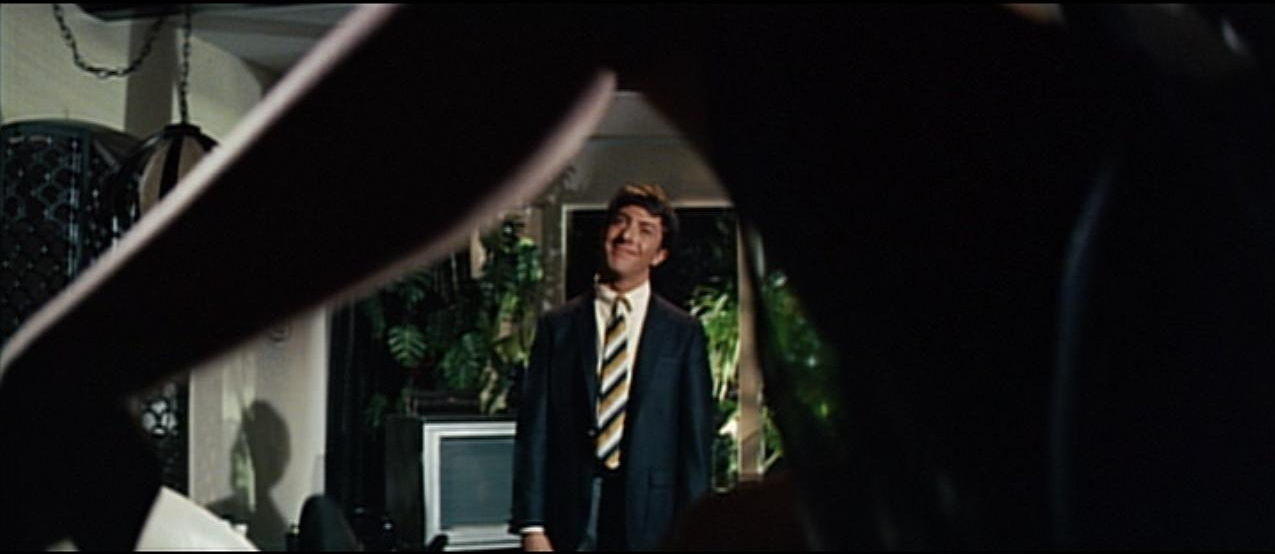
Getting personal now, The Graduate is a film that has embedded itself deep inside me. Over the years, I have connected with many aspects of the film and on many levels. It’s a seasonal film for me, the sunny and warm scenes and settings cause me to crave watching it in the spring and perhaps it makes me long to have a summer like Ben’s, loafing aimlessly and floating in the pool. The addition of the music of Simon and Garfunkel add to the aura as their songs are introspective and gentle and they sound like the backyards and the streets shown in the film. I suggested before that the music goes hand-in-hand with the action here and is a perfect companion. Benjamin, you feel, would indeed be pondering his future to the strains of “April Come She Will”.
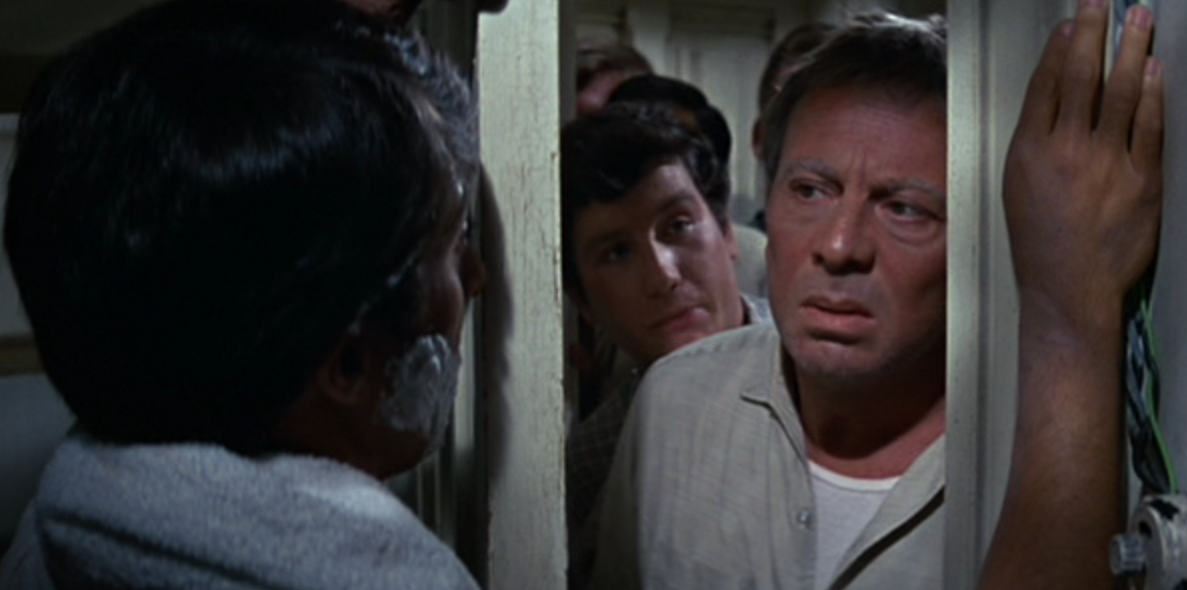
The personal dynamics of the film are captivating. The Graduate is often looked at as “anti-establishment” and if it is such it is in a passive, understated way. Ben does not violently rebel against his family but he tries to make it known that he wants something different for himself than what they want for him. From the outset, Ben tells his dad that he is worried about his future; “I want it to be…different”. Watch him at his party. He’s caged and he is scrambling to find a way out.
You see that Ben has been trying to get his parents to listen to him. At the start of the film, when Ben is reluctant to come down to the party, his father finishes his sentences for him and thinks he understands what’s wrong with his son. But this comes from his assumptions and not because he has listened to his son; he hasn’t. So, Ben is forced to come down to the party just as he is later forced to don his birthday wet suit and flippers and perform for his folks and their friends. Again, Ben pleads with his father to listen to him. When he doesn’t, Ben turns to the only other parental figure who has taken an interest in him; Mrs. Robinson.
“Or we could just talk”. When Ben first calls Mrs. Robinson from the Taft, she asks him if he’s gotten a room. Here is when he suggests that alternately they could “just talk”; perhaps she could listen to him. But Mrs. Robinson isn’t interested in conversation. It’s almost as if Ben as no recourse then; a sexual affair is all that’s on the table so he takes it. When he later forces conversation out of Mrs. Robinson – see below – the results depress him and he ends up actually saying “let’s not talk at all”, the opposite of what he’s been wanting. Here perhaps is where the anti-establishment theme comes into play.
Depicted here is the decadent older generation. They do not listen to their children, they force them into life choices, they themselves are living unsatisfactory lives and are making bad decisions because of the fact they are being eaten up inside. The older generation are not helping Benjamin at all, they are not even listening to him, and this contributes to his disillusionment and his desire to live outside the prescribed guidelines.
Mrs. Robinson descends on Ben in a decidedly predatory fashion. She provides an escape from the party for him by asking him to drive her home. She coerces him inside, gives him a drink and then propositions him, saying she is “available” to him whenever he would like. His reaction is hilarious.
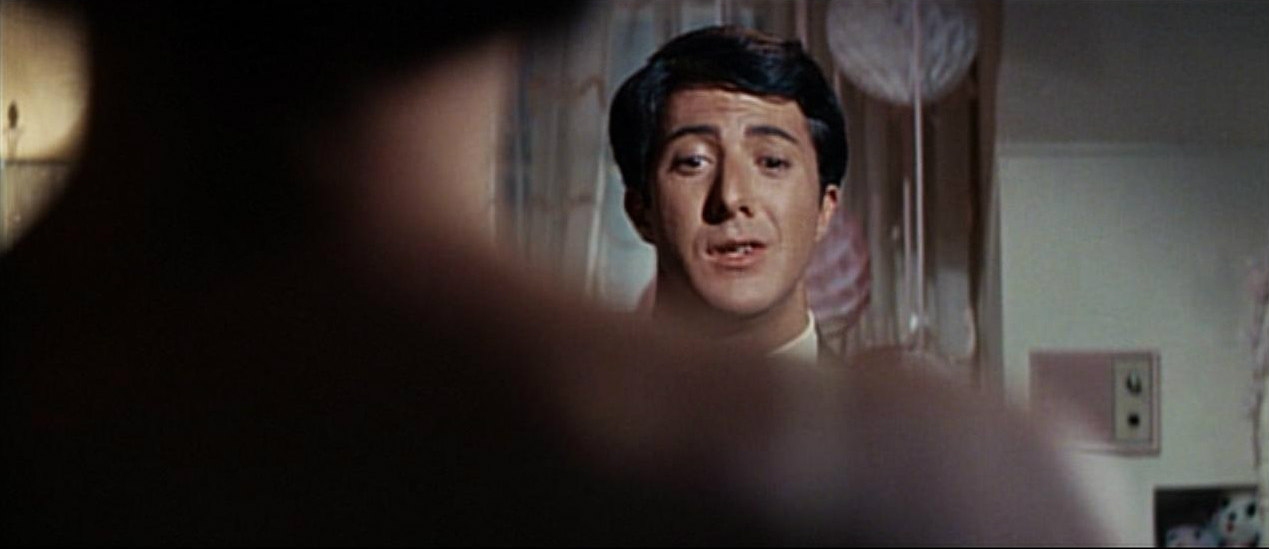
Once they begin their affair, Benjamin seems no more happy. In a compelling scene in a room at the Taft Hotel – played out mostly in the dark – Ben attempts to engage Mrs. Robinson in conversation, trying to glean something else out of their relationship. This is fascinating. Ben wants something else; Mrs. Robinson wants nothing else. His attempts are futile but what does come out is interesting. Ben learns that Mr. and Mrs. Robinson had to get married because Elaine was conceived out of wedlock and the Robinsons now have separate bedrooms. When Ben half-jokingly says he is going to take Elaine out on a date, Mrs. Robinson becomes incensed. She says that Ben is not good enough for Elaine and it is Ben’s turn to be angered. He has been struggling with guilt feelings regarding his relationship with Mrs. Robinson and when he is now told he is a flawed person who is not to sully Elaine, he lashes out saying he is not proud of himself because he spends all his time “with a broken-down alcoholic”. When he dresses to go, Mrs. Robinson makes an attempt to apologize but maintains her desire to keep Elaine and Ben apart. This depresses Ben but he decides to stay. Their passionless resumption of their affair is difficult to watch. This is an absorbing scene that says much about the two characters.
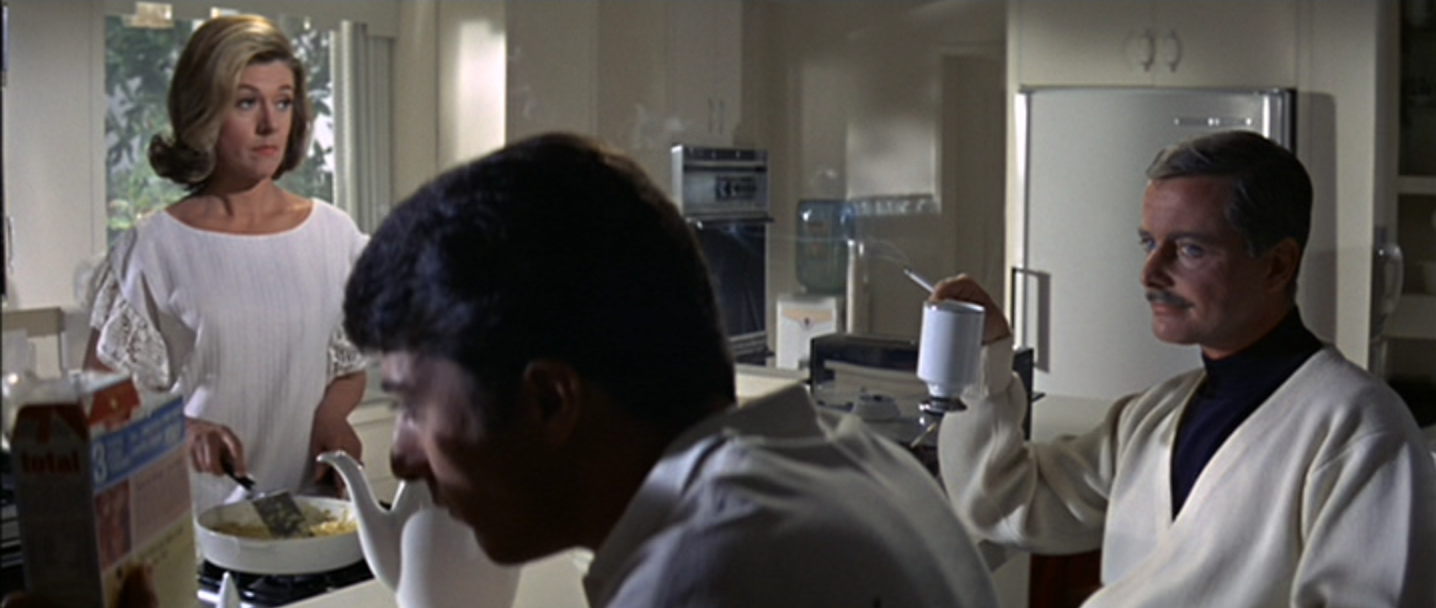
There is also much friction between Ben and his folks. They wonder what he does until all hours of the night but Ben stays distant. They think that setting Ben and Elaine up on a date will bring him out of his funk. Ben tries to beg off but when his family decides to have all the Robinsons come over for dinner – something he doesn’t think he could handle – Ben finally agrees to take out Elaine. When he comes to pick her up, the daggers Mrs. Robinson shoots him are striking. Watching Ben take Elaine out to a strip club and generally being obnoxious is painful to see. He finally comes around and the two talk. When Elaine guesses that Ben is having an affair, he admits it without telling her who it is with. The two begin dating and when Mrs. Robinson threatens to blow the whistle on him, Ben beats her to it and tells Elaine the truth. Elaine is disgusted and throws Ben out. As Ben leaves, Mrs. Robinson realizes the pain she’s wrought and the shot Mike Nichols stages is stunning.

With the lid blown off, the Robinsons hustle Elaine back to Berkeley and away from the monster, Ben; Mrs. Robinson has told Elaine that Ben took advantage of her and raped her. Ben follows Elaine up to Berkeley but she chills him, asking how could he rape her mother. Ben explains that Mrs. Robinson seduced him but Elaine doesn’t want to hear. Eventually, she softens, assumedly believing Ben over her mother. But still. I always shake my head that Elaine begins to consider a relationship with Ben knowing he has had an affair with her mother. The two scenes depicting Elaine showing up at the door of Ben’s rented room always fascinated me as a young man.
Elaine’s family has arranged a marriage for her with Carl Smith (Avery) – “he’s a medical student. We’ve known him for years”. Ben tries to encourage Elaine to marry him instead. He comically badgers her. Here is partly where the film gets its anti-establishment rep; the parents have strong expectations for the kids but the kids want to be free to live their own lives and make their own decisions. Elaine begins to waffle, telling Ben she will think about marrying him. To spite her parents? Because she really loves him? Mr. Robinson appears in Berkeley and threatens Ben never to see Elaine again. It kills me that we don’t have a scene in which the Braddocks – Ben’s folks – realize that their son has been having an affair with Mrs. Robinson, a long-time family friend and the wife of Mr. Braddock’s partner. Ben races to Elaine’s school but she has left. He goes to her home only to find Mrs. Robinson who tells Ben Elaine’s on her way to the altar and then calls the cops on him. Ben scrambles to find where the wedding is being held and races to the church, setting up another iconic sequence. In reality, it’s the United Methodist Church at 3205 D Street in La Verne, California.

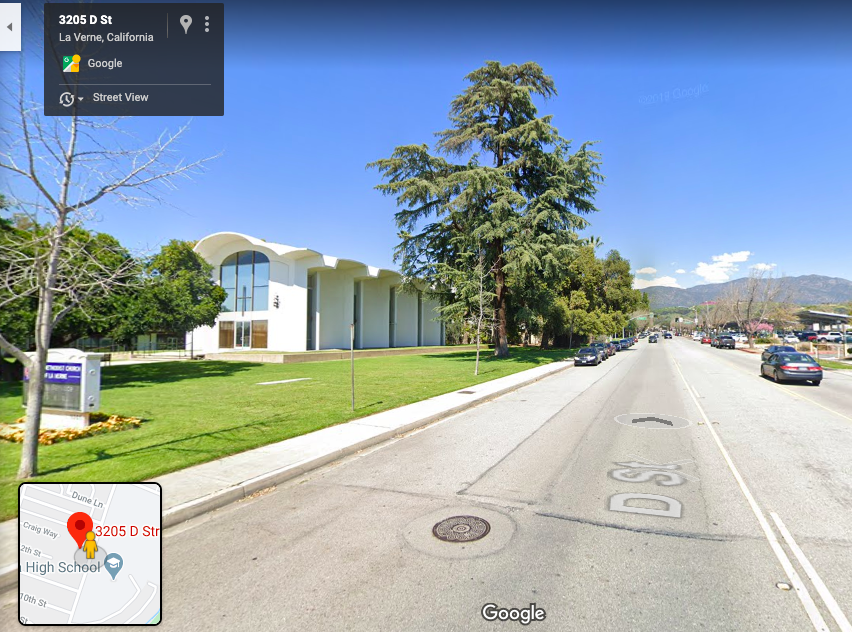
While it looks like Ben is too late, he charges into the church hollering for Elaine. As she begins to go to him, Mrs. Robinson grabs her, saying that it is “too late”. “Not for me”, Elaine replies, referencing the fact that she still has a chance for happiness in life, happiness that has eluded her mother. After a scuffle, Ben and Elaine laughingly run from the church and escape on a bus going down the street. The final scene is legendary. A disheveled Ben is sitting next to Elaine who is wearing her wedding dress. As the bus rolls along, other passengers regard the two curiously. Ben and Elaine smile at each other but as their laughter dies away, their faces turn solemn. They each stare straight ahead and smile but they don’t smile at the same time. This scene is often described as illustrating the uncertainty of relationships in general and of the future of this couple in particular and it drives home the painfully honest idea that this is not necessarily a happy ending and that life often does not provide one.
While this movie is among my 25 favourite films, I sometimes think The Graduate resonates with me like no other film. As a young man, I could relate to Ben while also my imagination ran wild wondering what I would do in his shoes. There is a wealth of depth in the story-telling and there is much to fire your own imagination in this unique tale. There are charming performances and wonderful direction with Mike Nichols achieving some really clever scenes. The story is captivating while maintaining its sense of humour. There is much of the spirit of 1967 to commune with here with some wonderful music and some great practical locations including the sparkling interiors of the Braddock and Robinson homes. And despite some rain, the weather always seems pleasant. For me, it checks all of the boxes. So, here’s to you, The Graduate.
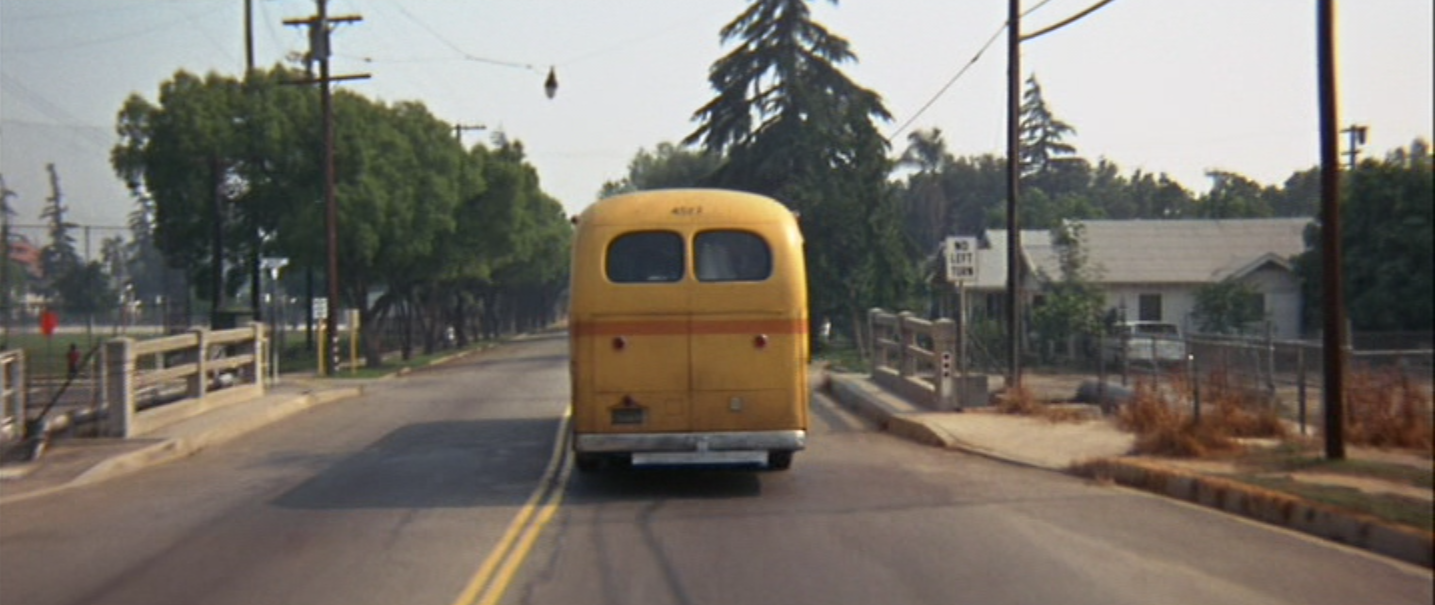
Not seen this film for years. You’ve made me want to dig out my DVD version and watch it!
Oh, Stevie, you got to! It is just excellent.